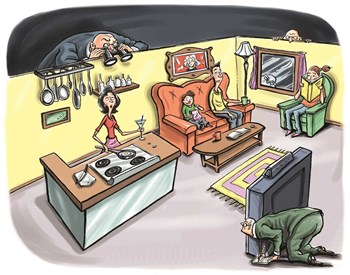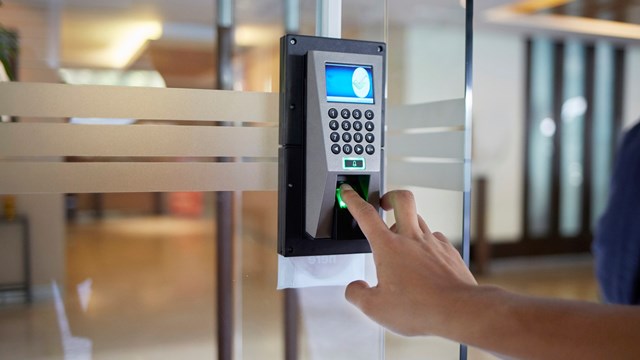
Providing safety and security is important, but condominium security providers consider each location a unique challenge. Without caution, an attempt to provide security can backfire, producing anger and anxiety instead. Responsive management helps forestall most worrisome situations.
That didn't happen in Lauderhill, Florida, earlier this year, after a few residents of the 55-and-over Castle Gardens community complained bitterly about armed security guards. They described incidents involving scuffles, handcuffs and harassment by the gun-toting security service brought in after residents expressed safety concerns. When the association didn't respond sufficiently, residents complained multiple times to local police. Then, five of them hired legal representation—obviously not a situation any condo association relishes.
New England condominiums tend to be considerably smaller than those in Florida. Here, associations concerned with security and liability try to provide the best security at the most cost-effective price—and say residents seldom complain.
By its nature, condominium living involves nearby neighbors, rules and restrictions, and controlled access—all of which help convey a relative level of security, supplemented by technology and concierge presence. The question of adding more seems to depend upon the level of risk.
A Balancing Act
“It really is a property-specific issue,” says Bob McBride, CEO at The Dartmouth Group, a management company in Bedford, Massachusetts. “Urban properties have a greater need and typically a greater emphasis on security.” At the other end of the spectrum are townhomes. “They have the least, and security concerns are typically addressed via simple home alarm solutions.”
By and large, residents are content to let technology and/or the presence of a trained concierge or guard bear the perceived level of risk. The Federal Bureau of Investigation (FBI) says roughly 70 percent of burglaries are residential (statistics include condo and apartment units). Condo associations address that risk through professional assessment. Options vary from state to state—Massachusetts, for example, has strict outlines for invasion of privacy—but the allowances to help secure residences are fairly standard from one state to the next: landscaping and building entry security, alarm and monitoring technology, concierge and guard services.
“Newer or renovated properties in high-crime areas will reflect a higher level of security, either through the physical presence of security officers or more sophisticated electronic measures,” said Ed Ramsdell, managing partner/New England for Aron Security, Inc., in West Springfield, Massachusetts. He says residents don’t exhibit increasing concerns about crime. “Generally, security measures have stayed constant, depending on the incidents or crime statistics within any specific geographic area.”
The evolution of technology helps reassure condominium dwellers. David Abel, CMCA, senior property manager with First Realty Management Corp. in Boston, manages condominiums ranging from townhouses to mid-rises, including large urban communities. As technology improves, and prices decrease, communities upgrade what they’re using.
In older properties, Abel says, there may be dozens of keys to certain units—an invitation for crime. “Residents will either have to change the locks and issue new keys or go with a card system. While still expensive, cards have become more normal and accepted.” Urban condos require more measures, Abel says. “Suburban settings have more land, they’re spread out with more grounds, in one- or two-story buildings with private entrances, a garage. Frequently, the property has a private road, so anyone coming through kind of sticks out. They seem to have fairly little activity in terms of problems. In a city, there’s always more concern for safety and security.”
There’s yet another reason to upgrade security, says John DeBarge, president and CEO of Arrow Security Inc. of Springfield: litigation. “We’re a very litigious society,” DeBarge said. “There's a need for associations to protect themselves against lawsuits, in case something happens.” Boards must evaluate location, he says. “An inner-city, high-crime area is a totally different situation, where you need an extremely secure facility. They may need an armed guard or two at entry points. But a lot of assessment goes into that decision first.”
Haste makes waste: “Sometimes, measures are implemented in haste, due to a recent event or events,” Ramsdell said. “Responsible property owners or condo associations should take the time to conduct a proper comprehensive security survey of the specific property prior to the implementation of any security measures.” (He recommends checking http://foresight securityriskmanagement.wordpress.com/ about).
“Communities that have interior common halls are usually concerned with building access,” McBride said. “The setup for this is often a camera-phone system, whereby the unit owner can see visitors on a monitor first.” Study the physical layout, he says. “Depending on the layout, steps may be adding periodic car or foot patrols, the installation of camera systems, or longer hours for lobby concierge /security staff.
“The newer properties are taking advantage of natural barriers—fencing, walls, a long stretch of open space surrounding the site, etc.—to protect against intruders,” DeBarge said. “You look at the age of the residents to determine what their needs might be: whether they're a younger crowd; if there are rental issues; whether it’s an apartment-type complex, or has multiple floors; the possibility of medical assistance calls with an older population. You look at crime stats for that location, that being the most serious issue—if anybody feels threatened by criminal activity in the area. We formulate the plan by the actual needs and concerns of that property.”
Consider the Options
Aron Security offers options based on its assessment, Ramsdell says. “This may include the physical presence of security officers, electronic security measures, or a combination of the two. Specific security needs for any given property may also be determined by a state law concerning the condo association’s obligation to provide a secure and safe environment, or any requirement dictated by the property’s insurance carrier.” Managers say insurance requirements are minimal until such time as a risk is defined. “Outside of any legal or insurance obligation for a specific level of security, implementation of security measures will certainly be assessed by their value-added vs. cost,” Ramsdell said.
Attorney Henry Goodman, a partner with the law firm of Goodman, Shapiro & Lombardi in Dedham, Massachusetts, says that checking with an attorney regarding state law is probably a good step before revising any security plan. “Massachusetts, for instance, has fairly strong laws against invasion of privacy, which includes the taping or photographing of persons, such that if you have a photo of a person in the commission of a crime, it may be suppressed if you didn’t give them enough notice.”
Such technology requires signage. “When boards want to put in security cameras, I give them specific advice as to what type of notices should be put up, and what the cameras should be—and not be—pointed at,” Goodman said. Not bathrooms, not bedrooms: “The board is responsible for maintaining the common property, not the interior of units,” Goodman said. “The cameras should be trained on entranceways, hallways, areas like that.”
Abel concurs. “Cameras at main points, don’t bother people,” he said. “Scan the public areas, like garage, pool, entrances, laundry area, mailroom, maybe, the fitness room. You want to have the high-traffic areas covered.” Such scrutiny isn’t foolproof, he adds. Cameras come in after the fact of a crime, to identify criminals, and are less helpful as prevention, though they may deter criminals.
High-rise condominiums with First Realty are equipped with security staff—generally a concierge—and camera systems. There are few problems at smaller properties, Abel said. “But it’s almost standard to have a camera in the parking lot, so if a car is broken into, you have some evidence.”
Concierges provide a presence between the outside world and residents, able to stop and question visitors, accept deliveries and otherwise bolster security. In this region, condo associations—both urban and suburban—prefer them to guards, but again, this is subject to environment. When guards are in place, they are usually unarmed.
Most security experts and condo managers agree guns add danger. “Google George Zimmerman!” advised McBride about the news-making case in Sanford, Florida. Zimmerman, you may remember, is the neighborhood watch volunteer coordinator, who took the law into his own hands when he shot and killed teenager Trayvon Martin at his condo in 2012. “Guard services aren’t a perfect answer. They are a warm body to deter criminals, and an additional set of eyes to protect a particular area of the community.”
Goodman advises checking into a security firm’s background, making sure employees are vetted and bonded. “They’re not a police force; they don't have enforcement authority, so they shouldn't go in and try to break up a fight. They’re not there to place somebody under arrest, and this has to be conveyed to unit owners.” He says an association could be held liable if someone is hurt and it is determined that firing a weapon was unjustified. There may also be a false sense of security. “The problem with any type of security system is that people have to be made aware of the fact that they are not guaranteed that they are protected; people can still sneak by security forces, disable cameras, and otherwise gain access to the property.”
Better firms extensively train employees, often hiring former military or police officers. Arrow’s DeBarge is no fan of armed guards, though he will provide them in high-risk situations, like urban emergency rooms. DeBarge bases his view on a lifetime of police and military police work, as well as a master’s degree in the field. “Guns escalate the situation. The reality is, if a guard is armed in a situation where there was no weapon, you’ve now introduced a weapon. It can be taken away in a tussle, and then you've got somebody who’s armed.” If arms are a necessity, he prefers that the association hire police officers. “We would never recommend that an association go out and get special police powers for a condo property. If things are that bad, you should be hiring police. Pay the extra money; the association is then indemnified.”
“The guards will do the best they can, within their abilities, to calm the situation down, then call the police. They all receive extensive training in de-escalation. We advise the guards how to respond to these situations. I have yet to know where having a weapon has changed (a tense situation) to the good side.” Armed guards can frighten residents, escalating any situation.
Bottom line for guards: deter or detect, and then tell the proper authorities.
Security and privacy are often intertwined and with proper management and communication, they can co-exist not only peacefully but successfully, ensuring a happy, healthy and safe community for all.
Ann Connery Frantz is a freelance writer and a frequent contributor to New England Condominium.






Comments
Leave a Comment